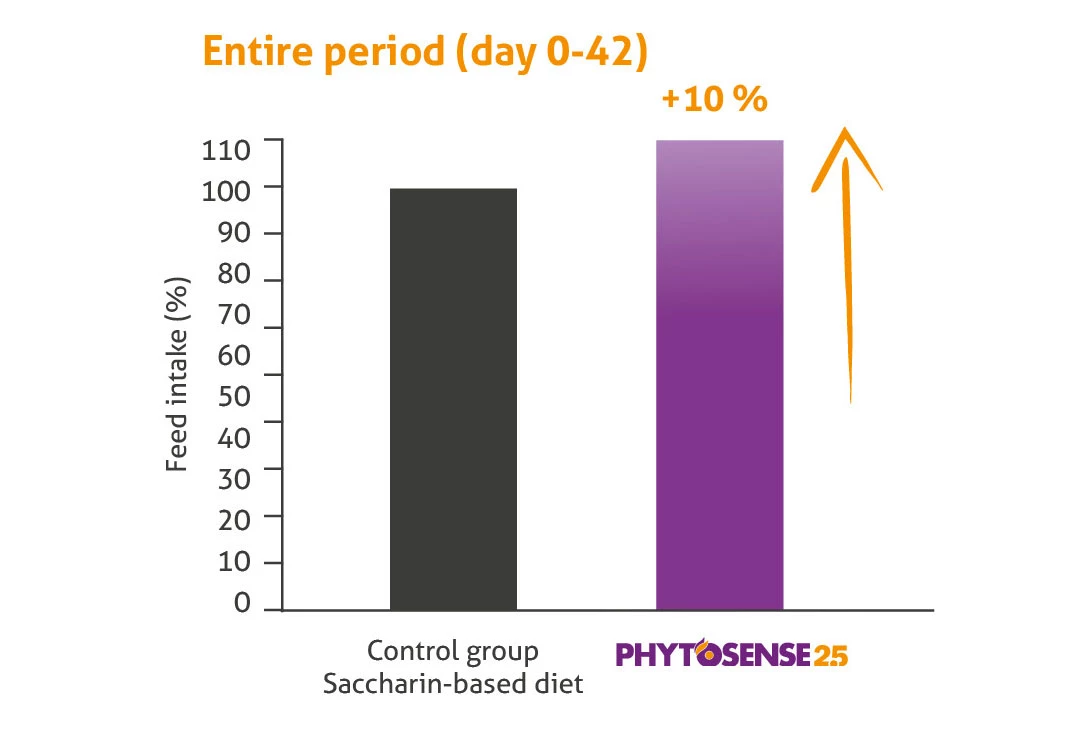
The post-weaning period is a critical window in pig production. It is marked by sudden environmental, social, and dietary transitions that often lead to feed intake depression and slowed growth. To mitigate these effects, sweeteners have traditionally played a key role in maintaining feed palatability and acceptance. However, with the European Commission’s recent regulation (EU 2024/1727) banning the use of saccharin in animal feed from July 2025 onwards due to its environmental and occupational health risks, the feed industry faces a pressing need for sustainable, effective alternatives.
Piglets face multiple challenges during weaning: they are separated from the sow, introduced into new social groups, exposed to unfamiliar environments, and must transition from easily digestible sow’s milk to solid feed. This abrupt shift often results in reduced feed intake, increased susceptibility to disease, and slowed growth performance.
Feed palatability plays a central role in overcoming these weaning challenges. Well-designed sweeteners and flavours can mask off-flavours from plant-based proteins, promote positive feeding behaviour, and ensure sufficient nutrient intake during this vulnerable phase. Historically, saccharin-based sweeteners have filled this role effectively. However, recent regulatory developments have rendered these products obsolete in Europe, prompting a shift toward next-generation sweetening solutions.
The European Food Safety Authority (EFSA) has raised environmental concerns regarding saccharin’s degradation products, particularly 4-hydroxysaccharin, which has been found to persist in groundwater. In addition, occupational health risks during the handling of saccharin-containing premixes further contributed to the European Commission’s decision to prohibit its use in feed from mid-2025 onwards.
This upcoming ban leaves a gap in nutritional strategies for early-life piglets - particularly during the post-weaning stage - where consistent feed intake is essential for maintaining health and performance. To fill this gap, a new saccharin-free sweetener has been developed: PhytoSense 2.5.
PhytoSense 2.5 is a novel, saccharin-free sweetener developed by Phytobiotics to maintain feed attractiveness in a sustainable and regulatory-compliant way. Its formulation is based on natural ingredients and optimized for the sensory preferences of young animals. The development focused on a smart combination of selected ingredients that act synergistically to enhance the sweetness effect while creating a pleasant mouthfeel. The product delivers a pleasant, sweet profile combined with red berry notes, providing an intense and consistent taste experience that promotes voluntary feed intake.
Importantly, PhytoSense 2.5 is designed as a drop-in replacement for saccharin-based sweeteners. With an inclusion rate of 150 g per ton of feed, it integrates seamlessly into existing formulations without the need for reformulation or dosage adjustments. Its robust heat stability also ensures performance across various feed processing conditions, including pelleting.
In addition to its application in piglets, PhytoSense 2.5 has also been developed for use in other species such as fattening pigs, lambs, calves, and sheep, offering a versatile sweetening solution for a wide range of young and growing animals.
Early-life nutrition plays a crucial role in shaping lifelong animal performance - a concept known as metabolic programming. Around weaning, maintaining steady feed intake supports gut development, microbiota stability, and helps prevent digestive issues such as post-weaning diarrhoea.
Sweeteners like PhytoSense 2.5 enhance feed palatability by providing sensory cues that encourage feed consumption. In piglets, these cues are especially effective when they resemble the naturally sweet flavour of sow’s milk. This familiar taste can activate memory-based feeding responses, promoting comfort and reducing weaning stress. As a result, piglets are more likely to accept solid feed, supporting a smoother transition and stronger early growth.
To assess the efficacy of PhytoSense 2.5 in real-world conditions, a 42-day feeding trial was conducted using 400 weaned piglets aged 26 days. The animals were assigned to two groups:
Control Group: Feed supplemented with 150 g of a conventional sweetener blend (95% saccharin + 3% NHDC)/ t final feed
PhytoSense 2.5 Group: Feed supplemented with 150 g PhytoSense 2.5/ t final feed
Throughout the trial, both groups received diets identical in nutrient composition. Performance metrics such as average daily feed intake (ADFI), average daily gain (ADG), and feed conversion ratio (FCR) were recorded.
In the first 14 days post-weaning (pre-starter phase), piglets receiving PhytoSense 2.5 consumed 7% more feed than the control group, while maintaining similar ADG and FCR.

By the end of the 42-day trial, cumulative feed intake in the PhytoSense 2.5 group was 10% higher compared to controls. This increased intake did not compromise efficiency, as ADG and FCR remained statistically comparable. Furthermore, preference tests conducted during the trial indicated a strong palatability advantage in favour of PhytoSense 2.5.

These results highlight the dual benefit of PhytoSense 2.5: it supports performance by ensuring strong early feed intake while also aligning with evolving regulatory and sustainability demands. For feed manufacturers, it offers an immediate and practical solution to replace saccharin without compromising on quality or efficacy.
Moreover, the product’s natural formulation contributes to environmentally responsible feeding strategies - an increasingly important consideration for modern livestock producers seeking to meet both animal welfare expectations and environmental goals.
As the feed industry prepares for the upcoming EU ban on saccharin, PhytoSense 2.5 emerges as a next-generation sweetener tailored to the needs of post-weaning piglets. With its natural composition, robust sensory performance, and proven ability to increase feed intake, it offers a future-proof solution for sustainable animal nutrition.
By supporting early-life development and minimizing feed-related stress, PhytoSense 2.5 not only addresses the immediate challenge of maintaining intake post-weaning, but also contributes to long-term productivity and animal well-being. It is a compelling choice for those seeking to combine performance with responsibility – without compromise.
Learn more about our Sweeteners Portfolio >>

Dr. Anne Winkler: After obtaining a Diploma in Agricultural Science, Anne pursued a Master's degree in Agricultural Science and Environmental Protection at the University of Applied Sciences in Bingen. In 2018, she earned a PhD in Agricultural Science from Martin-Luther-University Halle-Wittenberg. With her strong scientific background, Dr. Anne Winkler now brings her expertise to her role as the Global Product Manager for Flavours & Sweeteners at Phytobiotics.
Contact our experts or send us a message. We will contact you as soon as possible.